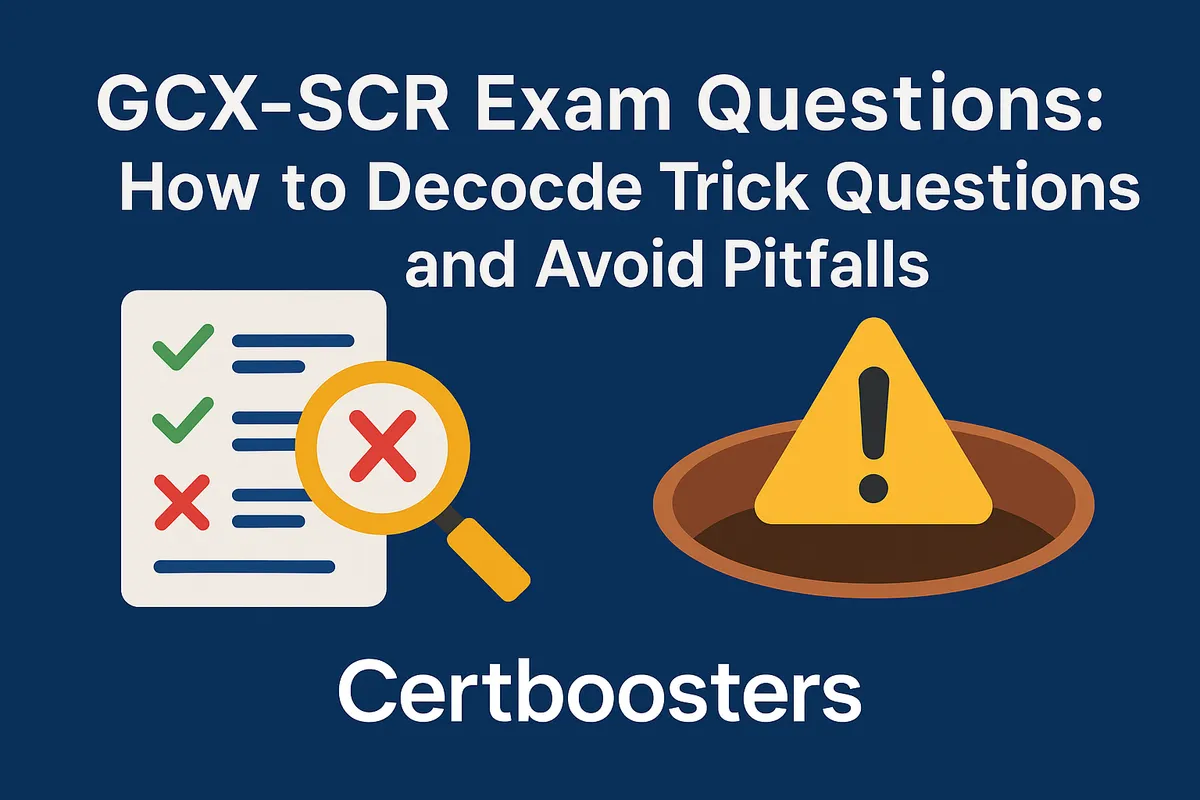GCX-SCR Exam Questions: How to Decode Trick Questions and Avoid Pitfalls

Preparing for the GCX-SCR Exam Questions can feel like navigating a minefield. With a blend of technical topics, situational scenarios, and high-pressure formats, this exam is specifically designed to challenge your knowledge, analytical thinking, and decision-making under stress. For many candidates, the difference between passing and failing often comes down to understanding how to decode trick questions and steer clear of common pitfalls. This guide will help you develop strategies to tackle those challenges head-on, ensuring you're fully prepared for test day.
Understanding the GCX-SCR Exam Structure
Before diving into strategies for decoding tricky questions, it's essential to understand the structure of the GCX-SCR Exam Questions. Typically, the exam includes a mix of multiple-choice questions, situational judgment scenarios, and real-world problem-solving case studies. These questions are designed not just to test what you know, but how you apply it.
The most common challenges candidates face include:
- Misinterpreting the question intent
- Choosing the first seemingly correct answer
- Getting trapped by distractors (plausible but incorrect options)
- Overthinking the scenario or context
The key to mastering this exam lies in practice, strategy, and a clear understanding of what the exam is truly asking.
Decoding Trick Questions
Trick questions aren’t there just to confuse you. They are crafted to assess your attention to detail, your depth of understanding, and your ability to think critically. Here's how to break them down:
1. Analyze the Question Stem Carefully
Every word in a GCX-SCR question is placed with intention. Watch for absolutes like "always," "never," or "only." These can be red flags. Instead of rushing to the answer choices, read the question stem two or three times. Highlight key terms that indicate what is really being asked.
2. Identify Distractors
GCX-SCR questions often include one or two answer choices that are almost correct but miss the mark subtly. Learn to spot these by:
- Comparing each option to the core principles or best practices
- Eliminating answers that are only partially true
- Avoiding assumptions not directly supported by the question stem
3. Reverse-Engineer the Question
Try to determine what the test-maker is trying to assess. Is this a test of process understanding, ethics, or risk management? Once you know the domain, it’s easier to predict the best possible answer.
4. Don’t Overthink Simple Questions
Some GCX-SCR Exam Questions are straightforward by design, but test-takers often read too much into them. If a question seems simple, double-check for traps, but don’t invent complexity where there is none.
Common Pitfalls and How to Avoid Them
Recognizing and avoiding common pitfalls is just as important as decoding trick questions. Here are the major ones:
1. Time Mismanagement
Some candidates spend too long on a single difficult question, leaving insufficient time for others. Stick to a time budget per question. If unsure, mark it for review and move on.
2. Ignoring Keywords
Words like "best," "most likely," "least effective," and "first step" can completely change the answer. Highlight these words to stay aligned with the question's intent.
3. Overconfidence in Prior Knowledge
Sometimes, your past experience might contradict exam best practices. The exam tests standardized principles, not personal work habits. Go with the textbook answer when in doubt.
4. Failing to Review
Always reserve time at the end of your session to review flagged questions. A second look with a calmer mind can reveal errors in logic or comprehension.
Mastering the Art of Practice
The most effective way to prepare for GCX-SCR Exam Questions is through consistent, targeted practice. Here's how to make your study sessions productive:
- Use scenario-based questions to simulate real test conditions.
- Analyze your mistakes deeply; don’t just note the right answer.
- Track patterns in your errors to identify weak areas.
- Mix easy and difficult questions in each session to keep your mind agile.
Mental and Physical Prep for Exam Day
Your mindset and physical state on the day of the exam can influence performance just as much as your preparation. To ensure peak performance:
- Get a full night’s sleep before the exam.
- Eat a balanced meal to stabilize energy.
- Practice mindfulness or deep-breathing exercises to manage anxiety.
- Arrive early to settle in and reduce external stressors.
Practice vs. Real Exam Questions
It’s worth noting that while practice questions are essential, they may differ in tone and complexity from the actual GCX-SCR Exam Questions. Therefore:
- Use official resources when available.
- Diversify your question sources.
- Focus more on understanding concepts than memorizing questions.
Why Choose Certboosters for Your Exam Preparation?
If you’re serious about passing the GCX-SCR exam on your first attempt, Certboosters is a smart choice. With a proven track record, Certboosters offers expertly designed study materials, mock exams that mimic the real test environment, and targeted feedback to help you focus on your weak areas. Their content is continuously updated based on industry trends and changes to the exam structure, ensuring that you're always studying the most relevant material. Whether you’re just starting or need that final push, Certboosters provides the resources and support to help you succeed with confidence.
Final Thoughts:
Success in the GCX-SCR exam is not about rote memorization; it’s about mastering the mindset behind each question. By learning how to decode tricky phrasing, stay alert for misleading options, and manage your test-taking strategies, you set yourself up for success.
Focus on understanding core concepts, practicing in realistic conditions, and avoiding common mistakes. With the right preparation and mindset, the GCX-SCR Exam Questions become less of an obstacle and more of a stepping stone to your career advancement.